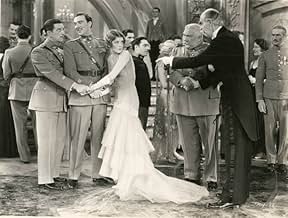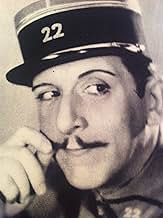Añade un argumento en tu idiomaA Legionnaire in love with an aspiring opera singer is expected to marry the general's daughter, who in turn is in love with another soldier.A Legionnaire in love with an aspiring opera singer is expected to marry the general's daughter, who in turn is in love with another soldier.A Legionnaire in love with an aspiring opera singer is expected to marry the general's daughter, who in turn is in love with another soldier.
- Bellini's Theatrical Manager
- (sin acreditar)
- Cafe Manager
- (sin acreditar)
- Gino - Orchestra Leader in Cafe
- (sin acreditar)
- Cafe Waiter
- (sin acreditar)
- Specialty Dancer
- (sin acreditar)
- Specialty Dancer
- (sin acreditar)
- M. Bachegalupé
- (sin acreditar)
- Milan Opera Fan
- (sin acreditar)
- Reception Guest
- (sin acreditar)
Argumento
¿Sabías que...?
- CuriosidadesAlthough originally released in 2-strip Technicolor, the film only survives in black and white. The narrower surviving sound on film version is apparently the sole source of today's television prints, resulting in a loss of image on the left hand side which becomes all too apparent in the lop-sided musical numbers and cropped newspaper headline inserts.
- PifiasA poster advertises the opera Carmen by Bellini. Carmen is actually by Bizet.
- Citas
Mme. Cecile: [Finding her employee, Fifi, smooching with Legionnaire Paul] Fifi! So this is the way you waste your time - canoodling!
Paul de St. Cyr: [Paul and Fifi get up, looking guilty] Don't blame Fifi, madame. It's my fault.
Mme. Cecile: Don't tell me what to do, you... you canoodler! Come, Fifi.
- ConexionesVersion of Mademoiselle modista (1926)
- Banda sonoraClothes Parade
(1905) (uncredited)
Music by Victor Herbert
Lyrics by Henry Martyn Blossom
Sung and danced by a chorus at Cecile's Modiste's shop
However, plot was never really the point of this early talkie operetta. The point was comedy and good tunes and good fun, and at that it succeeds quite well. Don't let any other possible bad experiences with early talkie musicals deter you from watching this one - it's one of the best of the first generation of musicals. Even Claude Gillingham's talent at cinematic grouchiness is turned into an opportunity for a memorable song, and Edward Everett Hornton, with a song in his heart if not on his lips and underneath all of that ridiculous Technicolor makeup is still Edward Everett Hornton who is always uniquely hilarious as he verbally takes you through whatever predicament he happens to be in. As someone else mentioned, the singer of note here is Bernice Claire as Fifi who inexplicably disappeared from motion pictures in the early 30's. Her voice is right up there with Jeanette McDonald's.
The only bad thing I have to say is that because the Technicolor print is lost and only black and white remains, some of the scenes and shots do not make sense. In Technicolor no doubt the dance numbers and long shots of production numbers would have been a feast for the eyes with their oranges, pinks, blues, and greens. Since film choreography at this time is pretty much non-existent what remains are shots of dancing girls moving about rather slowly, no doubt so you could get a look at their costumes which in black and white are nothing to write home about.
Highly recommended for the early talkie musical enthusiast.
- AlsExGal
- 1 abr 2011
- Enlace permanente
Selecciones populares
Detalles
- Duración1 hora 15 minutos
Contribuir a esta página

























